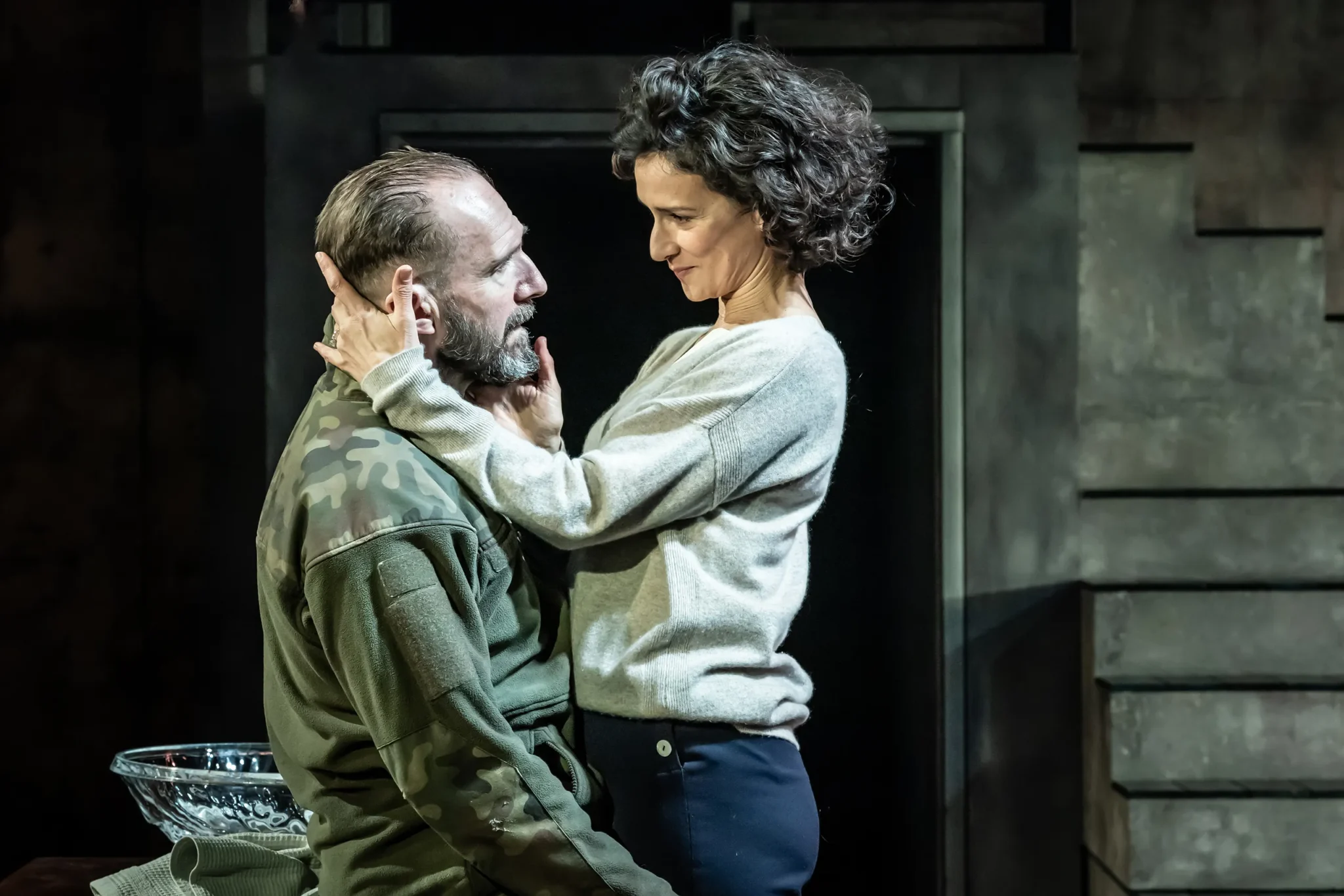When Macbeth cried “Sleep no more!”, I doubt he was aware of how little sleep his story would get in the neverending wheelhouse of Shakespeare productions. Undoubtedly one of his most popular and well adapted plays, National Theatre Live’s 2023 filmed production of Macbeth screening at the Playhouse in Sydney Opera House this May, joins the list as a grungy modern interpretation of the tragedy. Starring Tony and BAFTA Award winner Ralph Fiennes and Olivier Award winner Indira Warma, against a custom made backdrop built in Doc X London, we once again revisit our old favourites through the screen.
The adaption follows current attempts to modernise the setting visually and thematically by placing the characters in bullet proof vests and a brutalist concrete set, alluding vaguely to the modern era. While director Simon Godwin and adaptor Emily Burns use these new settings to explore the horrors of contemporary warfare by bringing a more grounded take on the more absurd and magical elements of the play, I found overall this adaptation lacked the grit and seriousness to make an impact in its critique of current conflict.
At many points of the film, actors would stare into the camera and smirk (as if they were Jim from The Office pulling a cheeky high treason prank). The actors seemed to all be inadequately briefed on how the camera would change the performance of a live play and so it was oftentimes unintentionally comedic despite the content’s tone. The cinematography showed interesting moments, particularly in the extreme close ups where the subtlety of the actors could be fully appreciated, but most of the time it was messy or at best standard for what we’d expect from a stage play. Adapting live theatre for the screen has historically been done from just a few flat angles of the stage leaning into documentation, whereas this adaptation attempted to expand and experiment on this medium. I yearned for some kind of visual change in the last act of the play when tensions were rising, perhaps to lean into the quirky camera side eyes and introduce some kind of handheld shots that would echo the deteriorating mental states of the characters.
Performances as well had a strange quality of this accidental comedy, where the tone and performances particularly by the leading cast were incongruent. Between Fiennes’ more sombre and mopey Macbeth to Warma’s more traditional Lady Macbeth, I found myself giggling at how often Lady Macbeth would need to swaddle her husband, speaking to him as if he were a toddler having tantrum over something completely banal. This iPad baby performance was perhaps not helped by Fiennes’ bad case of the Shakespeare voice, which is how I like to describe modern actors slurring every word of a play in monotone to sound more serious and old-timey. Warma’s performance of Lady Macbeth was, however, delightful in how it created a more understated and modern sense of the character. Her delivery of Lady Macbeth’s descent into madness was bitey but convincing in her sense of guilt. When we see her last, she is holding the hand of one of the audience members and disappearing up the stairs between the crowd, her body fading from the stage light. This more delicate and varied characterisation of Lady Macbeth was a particular standout for me.
However, other characters were not quite afforded the same exploration, and with the setting change to modern era, this adaption struggled to make its topics of class and warfare compelling. The witches, no longer supernatural hags, were replaced with three teenagers, wearing outfits I would have saved on Pinterest during the mid-2010s. It was made to contrast the more elegant and quiet-luxury style of the royal characters, but by choosing what felt like the safe and “timeless” choice for theatre, these costuming decisions did not emphasise enough how class affects the stake in warfare. I wondered, instead of a white blouse and button up for our leading duo, how would the play change if the characters wore what a true modern royal family would wear? Think Kate Middleton as Lady Macbeth and Prince William as Macbeth — how might a narrative of the elite change if we represented them more accurately in the disguises they clothe themselves in?
While I am a fan of theatrics and intricate sets and costumes, these, I concede, are not necessary for successful plays in the contemporary day. But what I do value in Shakespeare adaptations in 2024, is highlighting how the themes of these plays are not just important when we dress them in modern military gear, but how stories from our past lead into critical discussions about current happenings. With these clumsy contemporary parallels, I was left washed with a confusing and vague feeling of disappointment, wondering if the parallels I could have drawn from Shakespeare’s Macbeth myself would have been more worthwhile than trying to understand what this film presents as it’s 1:1. Compounded with the questionable performance and camera work, I felt that this film adaptation of such a well known and well represented tragedy was just a middling addition to what has come before.







